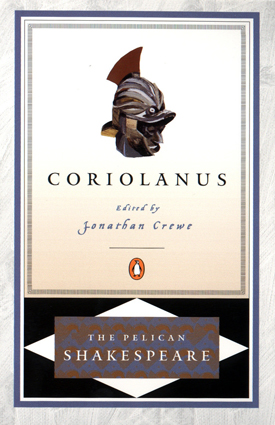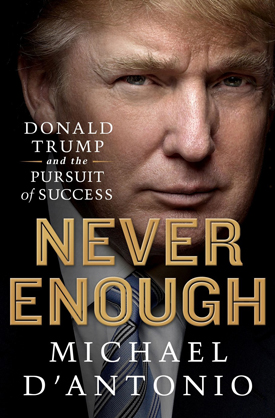Sizing Up Trump In the Age of “All About Me” With Help From Shakespeare and the Marx Brothers
By Stuart Mitchner
A little over a year ago, the morning after Donald Trump announced his candidacy, a Photoshopped image of his red-nosed circus-clown face filled the front page of the Daily News next to the massive headline CLOWN RUNS FOR PREZ. A little over a week ago, the day after Trump won the Indiana primary and became the presumptive Republican nominee, the front page of the same newspaper showed a piggy-bank-sized GOP elephant in a coffin with the words “Dearly beloved, we are gathered here today to mourn the death of a once-great political party, killed by epidemic of Trump.”
The clown-faced front page is reproduced in Michael D’Antonio’s Never Enough: Donald Trump and the Pursuit of Success (Thomas Dunne Books/St. Martin’s 2015), along with examples of the “field day” comedians had after Trump announced. David Letterman’s Top Ten list of Interesting Facts About Donald Trump included the “fact” that “during sex he calls out his own name.” For a narcissist of epic proportions, this is closer to “funny peculiar” than “funny ha-ha.”
So we’ve been Trumped. What to do? Where to go? Who to turn to for counsel and consolation? Shakespeare? Or maybe the Marx Brothers? I’m thinking of the old maxim “Many a true word hath been spoken in jest,” which is said to have its source in, of all people, Regan, one of the daughters from hell in King Lear, where she says “Jesters do oft prove prophets.”
The Sanity Clause
Last week when Speaker of the House Paul Ryan cited 1994’s Contract With America while sidestepping comment on his refusal to endorse The Donald, he unwittingly evoked the scene in A Night at the Opera where Chico and Groucho are haggling over a contract, rejecting one clause after another by literally tearing them out until the document is down to the part stating that the contract is nullified if any of the parties is shown not to be in their right mind, “what they call a sanity clause,” says Groucho. “You can’t fool me!” says Chico. “There ain’t no Sanity Clause!”
Actually, there is a sanity clause, Chico, in the form of the card that Barry Goldwater’s opponents played during the presidential campaign of 1964 when the euphemism for the senator’s mental state was “extremism,” from his much-quoted statement, “Extremism in the defense of liberty is no vice.” The cover of the September/October 1964 “Goldwater issue” of Fact magazine sounded it loud and clear: “1,189 Psychiatrists Say Goldwater Is Psychologically Unfit To Be President.” Inside were the results of a national poll of psychiatrists responding to a survey posing the question: “Do you believe Barry Goldwater is psychologically fit to serve as President of the United States?” Just over half of the 2417 psychiatrists who responded believed that Goldwater was not. This is the elephant in the room if you’re reading between the lines and behind the words of the various negative reactions, from both parties, provoked by Trump’s bizarre behavior. You have to wonder what the numbers would be should a similar survey be organized today.
Michael D’Antonio’s postscript (“Understanding Donald”) in Never Enough notes that “A few years ago, some in the psychiatric profession proposed that narcissism, which had long been regarded as malignant, be reconsidered.” After quoting a psychiatrist to the effect that narcissism is “an evolutionary strategy that can be incredibly successful,” D’Antonio refers to the “flourishing of the all-about-me technologies that have been adopted by so many hundreds of millions of people. Facebook, Twitter, Instagram, and even the selfie photographs that bloom by the millions online are all expressions of the kind of self-promotion that Trump has practiced for profit throughout his life.”
It was when Trump began beating the Birther drum that his state of mind became an object of concern for those of us who were disturbed by the media attention being given a wholly amoral, unscrupulous self-promoter determined to disparage and subvert the head of state, meanwhile discrediting the government and giving the world a clear preview of the campaign to come. No wonder Trump says what he’s quoted as saying on the back cover of Never Enough: “I don’t like to analyze myself because I might not like what I see.”
Over-Proud and Under-Honest
If nothing else, the situation at hand offers another excuse to read deeper into Shakespeare on this the 400th anniversary of his death. For a start, the noise level of the 2016 Republican primary calls to mind the renowned passage from Macbeth that ends with life as “a tale/Told by an idiot, full of sound and fury,/Signifying nothing.”
Julius Caesar got an oblique sighting in this Sunday’s Times, where Ross Douthat has Trump “actively campaigning as a Caesarist, making his contempt for constitutional norms and political niceties a selling point.” You can add to that the misogynist arrogance of Richard the Third sweet-talking the widow of the man he’s murdered (“Was ever woman in this humour woo’d?/Was ever woman in this humour won?”) and “over-proud” and “under-honest” Achilles in Troilus and Cressida, “in self-assumption greater/Than in the note of judgment,” not to mention his “savage strangeness” and “his pettish lunes, his ebbs, his flows, as if/The passage and whole carriage of this action/Rode on his tide.”
The Love of Power
Perhaps the most Trumpish type in terms of attitude and situation is Caius Marcius, alias Coriolanus. “The love of power in ourselves and the admiration of it in others are both natural to man, the one makes him a tyrant, the other a slave,” William Hazlitt has observed. “Wrong dressed out in pride, pomp, and circumstance, has more attraction than abstract right. Coriolanus complains of the fickleness of the people: yet the instant he cannot gratify his pride and obstinacy at their expense, he turns arms against his country.” It’s also worth noting that this fatally obstinate Roman warrior’s favorite exclamation is “Hang ‘em!” which could be construed as his version of Trump’s “You’re fired!” as it was crudely and sometimes obscenely recycled during the yah-yah-yah playground shouting match of the Republican primary.
Also reminiscent of the stop-Trump talk among fretful Republican leaders is the scene in Act One where two senators discuss how to deal with a man whose pride is unequaled, who with his taunts will “bemock” the gods and the “modest moon,” who is “grown too proud to be so valiant.” Who else but the great Deal-Maker comes to mind when one senator pondering how to command his “insolence” says, “Such a nature/Tickled with good success, disdains the shadow/which he treads on at noon.” Being “well graced” in fame, which cannot be “held nor more attain’d,” “what miscarries” shall be his fault, “though he perform/To the utmost of a man.” In other words, let he who bloweth his own horn be his own worst enemy.
Insolent and Injudicious
The introduction to the “Epilogue to Coriolanus” written by Jonathan M. Sewell in 1778 and reprinted in Shakespeare in America (The Library of America 2014), suggests that the play may have been performed before disgruntled American troops during the Revolutionary War, perhaps by amateur actors in the Continental Army as a reflection of “general discontent” that prevailed among the soldiers. Chosen because it was seen “as topical and anti-authoritarian, its martial hero a majestic Roman” who was “Driv’n” to act “by his country’s base ingratitude,” Coriolanus was for Sewell an object lesson for citizens not to “let your unrewarded sons complain/They wield the sword, and fight, and bleed in vain.” In another article in the same anthology, written by Charlotte Perkins Gilman on the 300th anniversary of Shakespeare’s death in 1916, Coriolanus is referred to as his mother Volumnia’s “crazy-tempered son … insolent and injudicious,” who “would not refrain from insulting citizens long enough to get himself elected; he who talked so loudly of his ‘country’ and evidently thought of nothing further in it than the first families.”
The scenes where his mother and his advisers are attempting to prepare Coriolanus for his appearance before the mob suggest something comparable to what Trump’s advisers will be contending with if they hope to tone him down for the debates and interviews to come. “Mildly” is the operative word. “Arm yourself/To answer mildly; for they are prepared/With accusations … more strong/Than are upon you yet.” Having Shakespeare in his DNA, Coriolanus is well aware of the absurd contradiction in terms (Arm yourself … mildly) as he goes forth to the market-place to “mountebank their loves” and “cog their hearts from them,” repeating the lesson (think of the Monty Python’s hospital ward for actors with the disease of over-acting): “The word is, mildly,” and after being reminded yet again (“Ay, but mildly”), he ends the scene thus, “Well, mildly be it, then; mildly.”
Of course the inevitable denouement of “mildly” comes when Coriolanus blows up and is banished, only to return the favor (as in, “You’re fired!”): “You common cry of curs! whose breath I hate/As reek o’ the rotten fens, whose loves I prize/As the dead carcasses of unburied men/That do corrupt my air, I banish you.”
This Means War!
Picture the first debate. The handlers have done their best. Mildly, mildly, they tell The Donald. He’s prepared, armed but thinking, “mildly?” And what if he works himself up? Like, say, Rufus T. Firefly in Duck Soup waiting for Ambassador Trentino, ready to offer him the right hand of good fellowship, feeling sure he’ll accept this gesture in the spirit in which it’s offered. But suppose he doesn’t. A fine thing that’ll be! He holds out his hand and Trentino refuses to accept. “Who does he think he is,” cries Firefly, “that he can come here, and make a sap of me in front of all my people? Think of it — I hold out my hand and that hyena refuses to accept! Why, the cheap four-flushing swine, he’ll never get away with it I tell you, he’ll never get away with it!” And when Trentino enters, it’s “So you refuse to shake hands with me, eh?” and whack! a slap in the face. “This means war!”
Back at the hypothetical debate, things are going anything but mildly. Trump doesn’t like the question — something about some country he never heard of. Rhymes with hair. Or was that a crack about his hair? “Who asked that question? What did Crooked Hillary say? — she who thinks she can satisfy the country when she couldn’t satisfy her husband? That’s it! Game over! I banish you, CNN! I banish Clinton! I banish the debate! I banish everybody and everything but myself! You’re all fired!”



